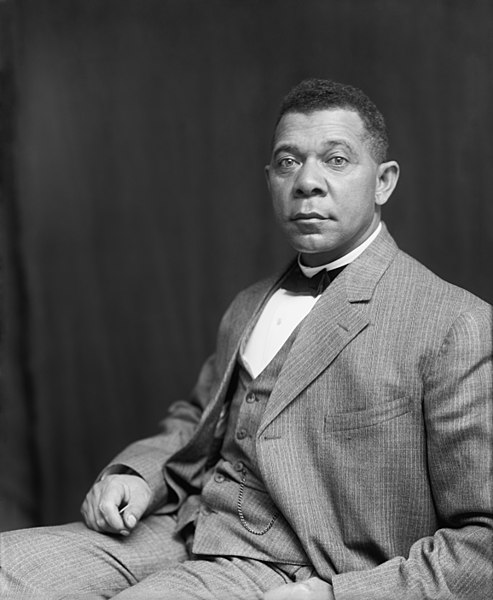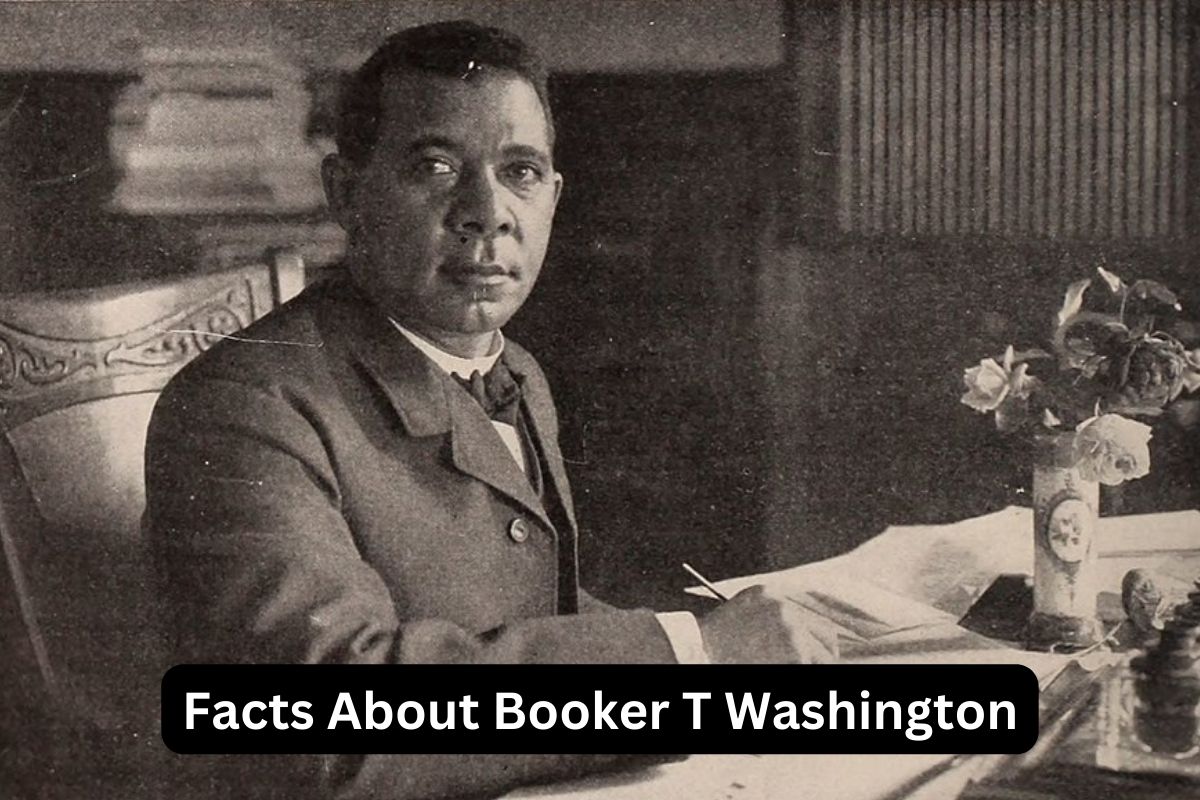Booker T. Washington (1856-1915) was an influential African-American educator, author, and civil rights leader. Born into slavery, he rose to prominence as the founder and principal of the Tuskegee Institute, where he focused on providing vocational education to African Americans.
Washington advocated for economic self-improvement and cooperation between races, promoting his philosophy of accommodation and gradualism in race relations.
While his approach faced criticism, he played a significant role in shaping educational opportunities for African Americans and advising U.S. presidents on matters of civil rights.
His autobiography, “Up from Slavery,” remains a seminal work, highlighting his remarkable journey from slavery to becoming one of the most renowned figures in American history.
Booker T Washington Facts
1. Born on April 5, 1856, in Hale’s Ford, Virginia
Booker T. Washington was born on April 5, 1856, in Hale’s Ford, Virginia. He was born into slavery, and his exact birth date and year are not known with certainty due to the lack of recorded records for slaves during that time.
Also Read: Booker T Washington Accomplishments
His early life was marked by the hardships and challenges faced by enslaved people, including limited access to education and basic rights.

2. Founder and first principal of the Tuskegee Institute (now Tuskegee University)
Washington became widely known as the founder and first principal of the Tuskegee Institute, located in Tuskegee, Alabama. He established the institution in 1881 with the goal of providing vocational education and practical skills training to African Americans.
The Tuskegee Institute focused on teaching trades such as agriculture, carpentry, blacksmithing, and domestic skills, aiming to equip its students with the necessary tools for economic self-sufficiency.
3. Wrote the autobiography “Up from Slavery” in 1901
One of Booker T. Washington’s most significant contributions was his autobiography titled “Up from Slavery,” published in 1901. The book detailed his remarkable journey from slavery to becoming a prominent educator and civil rights leader.
“Up from Slavery” provided a firsthand account of the harsh conditions and challenges faced by enslaved people in the South, as well as Washington’s personal struggles and triumphs.
The autobiography became immensely popular and was widely read, serving as a source of inspiration for many individuals striving for self-improvement and social progress.
Through his autobiography, Washington sought to convey the message that education and determination could uplift individuals and communities, regardless of their starting point in life.
4. Advocated for vocational education and economic advancement for African Americans
Booker T. Washington is well-known for his philosophy of accommodation and gradualism in race relations. He believed that African Americans should focus on economic advancement and self-improvement rather than directly challenging white supremacy.
This approach, often referred to as the “Atlanta Compromise,” aimed to establish peaceful coexistence and cooperation between African Americans and white Americans.
Washington believed that by proving their economic value and contributing to society, African Americans could gradually earn respect and equal treatment.
5. Delivered the Atlanta Compromise speech in 1895, emphasizing economic cooperation
In 1895, Booker T. Washington delivered his famous Atlanta Compromise speech at the Cotton States and International Exposition in Atlanta, Georgia.
The speech was a pivotal moment in his career and brought him national attention. In his address, Washington emphasized the importance of economic cooperation between blacks and whites, urging African Americans to accept temporary social inequality in exchange for economic opportunities.
While the speech received mixed reactions at the time, it solidified Washington’s position as a prominent figure in the national discussion on race relations.

6. Advised U.S. presidents, including Theodore Roosevelt and William Howard Taft
Despite his emphasis on economic progress, Washington also worked towards improving the political and civil rights of African Americans. He advocated for equal access to education, voting rights, and economic opportunities.
Washington believed that achieving these goals required a strategic approach that focused on building economic strength within the African-American community. He believed that once African Americans achieved economic success, they would be better positioned to advocate for and secure their political and civil rights.
This dual approach of economic empowerment and political engagement became a central aspect of Washington’s leadership and activism.
He aimed to uplift African Americans through education and economic independence while simultaneously working towards social and political equality.
7. Worked towards improving political and civil rights for African Americans
Booker T. Washington’s efforts to improve the political and civil rights of African Americans were evident in his actions beyond his emphasis on economic progress. He believed that education was crucial for empowering individuals to advocate for their rights effectively.
Washington actively promoted educational opportunities for African Americans, encouraging the establishment of schools and the pursuit of higher education.
He believed that education could equip African Americans with the knowledge and skills necessary to engage in the political process and bring about social change.
8. Emphasized practical skills and industrial training at Tuskegee Institute
Washington’s leadership and educational initiatives at the Tuskegee Institute had a profound and lasting impact on African-American education. He emphasized practical skills, industrial training, and agricultural education as vital components of the curriculum.
This approach aimed to prepare students for the practical challenges they would face in the workforce and enable them to contribute to their communities’ economic development.
Washington’s emphasis on vocational education and his promotion of self-reliance influenced the development of African-American education across the country, with his ideas shaping the curriculum and pedagogy of numerous institutions.
9. Received honorary degrees from Harvard University and Dartmouth College
Throughout his life, Booker T. Washington received numerous accolades and honors for his contributions. He was awarded honorary degrees from prestigious universities, including Harvard University and Dartmouth College.
These honors reflected the recognition of his accomplishments and the impact of his work in the fields of education and civil rights.
Washington’s influence extended beyond academia, as he was widely respected and sought after as a speaker, advisor, and advocate by various organizations and influential individuals of the time.
10. First African American to be invited to the White House
Booker T. Washington’s significance in history is exemplified by his position as the first African American to be invited to the White House.
In 1901, President Theodore Roosevelt extended an invitation to Washington, leading to a meeting between the two. While the event sparked controversy and drew criticism from some quarters, it symbolized a significant step forward in race relations.
The meeting served as a recognition of Washington’s leadership and influence, as well as a gesture towards improving the representation and inclusion of African Americans in national politics and decision-making processes. Washington’s visit to the White House marked a significant milestone in the ongoing struggle for racial equality in the United States.
